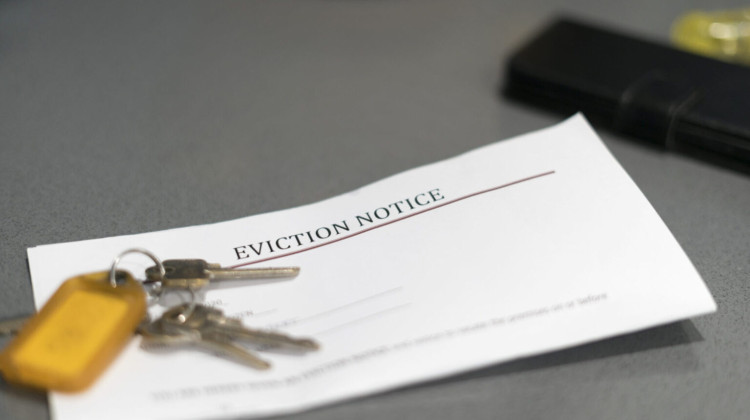
A House committee approved an amended bill that seeks to “streamline” the legal process for tenants to have certain evictions sealed from their record.
Getty ImagesAfter making new tweaks, a House committee pushed along a bill that aims to make it easier for renters to get certain evictions sealed from their record.
Housing advocates were frustrated last month after Senate Bill 142 was rolled back on the Senate floor, removing a provision to automatically expunge eligible evictions from tenants’ records.
But an amendment approved Monday by the House Judiciary Committee seeks to compromise by “streamlining the process” for courts to quickly seal some records — meaning renters would not have to file anything on their own.
That includes eviction cases in which a judge sides with a tenant, or when a judgment against the tenant is later reversed.
A state law passed in 2022 already opened the door for some eviction matters to be sealed, but it’s currently up to tenants to file for expungement.
Statehouse testimony on the latest bill draft was positive. The measure passed 10-1 — only Rep. J.D. Prescott, R-Union City, voted in opposition — and now heads to the full House.
“The idea is, let’s get those (evictions) expunged, because, as you know, that’s like a black mark, and it makes it difficult for (tenants) to find housing,” said bill author Sen. Liz Brown, R-Fort Wayne. “The idea is now, with this amended bill, (tenants) are going to have skin in the game. If they really want that to be expunged, they’re going to have to go in and do that. But so many of these eviction proceedings have been resolved, and both sides on the claim are happy, and there was just no way for them to clear the name, and I think this is a good start.”
Changes to the bill
When first introduced, Brown’s bill would have required courts to automatically seal an eviction from a tenant’s record, as long as they have settled their debt, or the court ruled in their favor. Cases would qualify, too, if the eviction was dismissed by, overturned or vacated on appeal.
The original bill also sought to automatically seal all eviction cases after seven years.
The seven-year seal was removed by a Senate committee, however. Later, in the full chamber, a separate amendment further watered down the automatic sealing — shifting the burden back to renters to file expungement paperwork with their local court, which is how the process currently works.
Amendment author Sen. Aaron Freeman, R-Indianapolis, said he didn’t want to overburden the courts and additionally wants tenants to be held accountable for evictions.
Monday’s House committee amendment specifies that a court, “on its own motion,” can expunge eviction records as long as one of the following applies to the case:
- the eviction action is dismissed by the court
- a judgment in favor of the tenant is entered by the court
- a judgment is entered by the court against the tenant, and the judgment is subsequently overturned or vacated on appeal
While not automatic, renters would further be able to seek expungement seven years after the conclusion of a case in which there was no money owed to the landlord.
There’s no waiting period, though, for tenants who have “satisfied” — paid back — a money judgment related to the eviction.
Committee chairman Rep. Chris Jeter, R-Fishers, said courts typically don’t take action in a case until “somebody files a motion asking them to do something.”
“I think there was a little concern about tasking the courts with sort of keeping track of where these evictions are at,” Jeter said. Evictions filed before 2021, for example, do not have case numbers to distinguish them from other small claims cases.
“I think one of the landing grounds we kind of came on is if it’s an order at the time when the judge (decides in favor of) the tenant, then they can seal (the eviction record) at that exact same time,” he continued. “But if it’s after, I think the thought is that we at least have the tenant take the proactive step of filing at least a one-page motion, or something, so the court can act.”
She emphasized that tenant-landlord bills are typically “difficult” to pass out of legislative committees.
“The idea is there are good landlords, and there are good tenants. And frankly, when there is an eviction proceeding — whether it’s a judgment, or a question of security deposits or damages in the resolve — it’s not really the landlord’s responsibility anymore. Their claim has been resolved, and they’re fine. I don’t think they necessarily want that tenant to have that black mark on them … but that’s the case right now,” Brown said.
“This will make it seamless for the tenant,” she added. “They’re already in court — it will make it automatic. … And there’s no reason, if the landlord has not pursued the judgment in seven years, why that, on the motion of the tenant, can’t also get expunged.”
Housing advocates supportive
Housing advocates were supportive of the amended bill and maintained that eviction sealing is “very important” for tenants because landlords won’t be able to see past eviction cases when screening potential tenants.
“Community stakeholders who are trying to create a new supply of housing and connect it with Hoosiers too often find that many Hoosiers don’t qualify for housing because they have that ‘Scarlet E’ of an eviction filing on their record,” said Andrew Bradley, with Prosperity Indiana. He pointed to data showing that 71,000 evictions were filed in the state over the last year.
“That’s a significant number of Hoosiers who now can qualify for safe, decent, affordable housing,” he said.
Brown crafted the legislation with input from students at the University of Notre Dame’s Eviction Clinic, which helps Hoosiers clear evictions off their records for free.
David Pruitt, director of the university’s Clinical Law Center, said a majority of the eviction clinic’s cases stem from just “one incident” in a renter’s life.
“There’s a medical bill, or a loss of a job, or something comes up, and the margins are so thin for people that they get knocked off track, and it’s hard for them to come up,” Pruitt said. “There are going to be some people that, honestly, are over their skis and they just found a place that’s just too expensive — and those are tough cases. And then you’ve got mixes of landlords being problematic, tenants being problematic. … But I would say that for significantly more than half of the individuals, it’s a razor’s edge.”
Indiana Legal Services, the largest provider of free civil legal aid to low-income Hoosiers, additionally worked on more than 1,600 eviction-sealing cases last year.
“That’s a testament for the need for eviction sealing and the assistance that folks currently need to kind of get through the system,” said Jennifer Terry, an attorney with the nonprofit law firm. “We do see this bill as a good next step in streamlining some of those processes.”
 DONATE
DONATE






 Support WFYI. We can't do it without you.
Support WFYI. We can't do it without you.